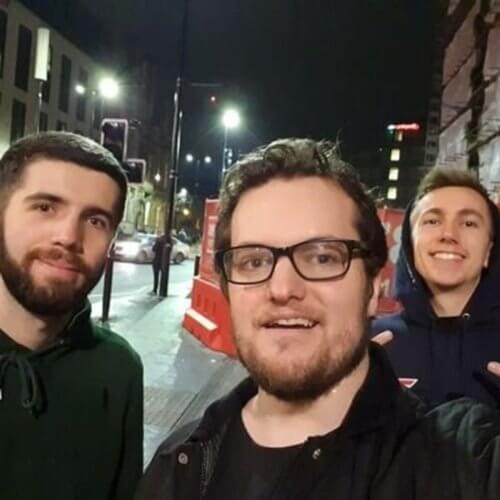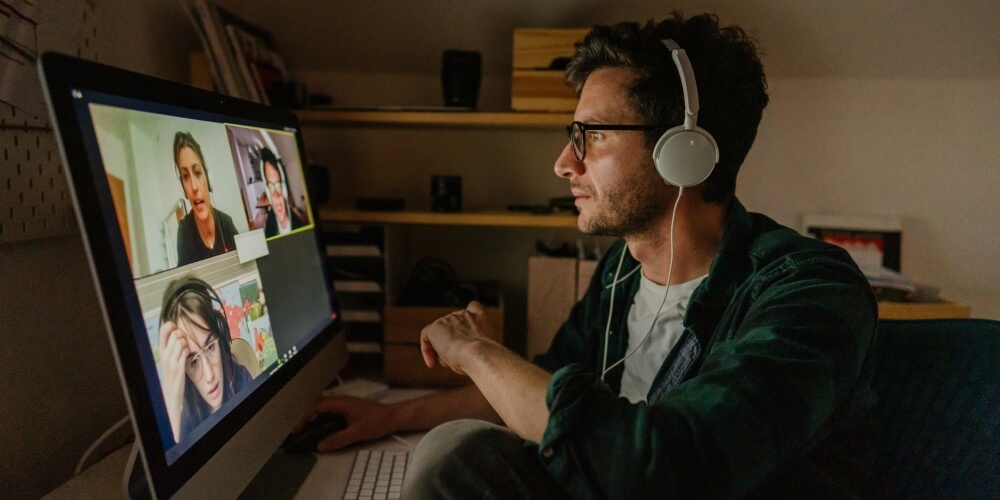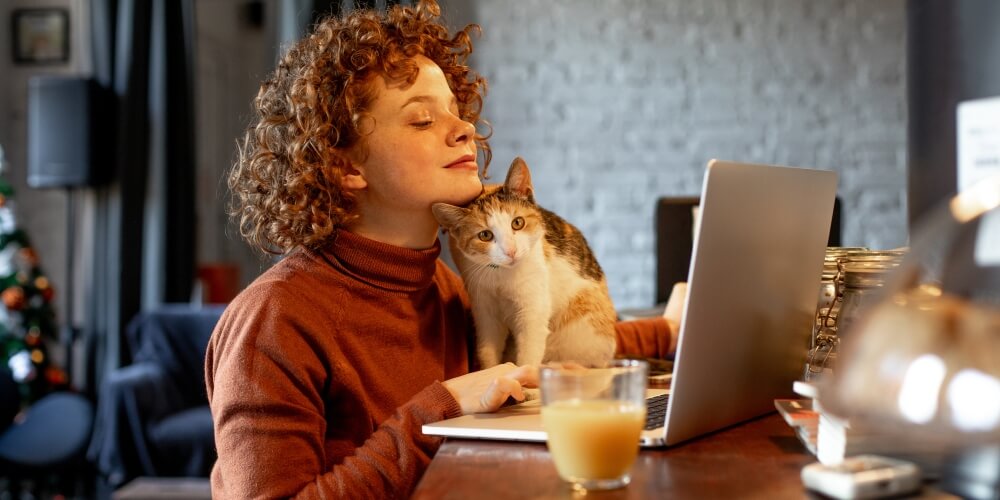When a crisis like COVID-19 puts your revenue in jeopardy, any shiny new prospective partner or campaign opportunity can look promising. But don’t let your guard (or your standards) down. How do you know if someone is genuine or looking for a profiteering opportunity? How do you know if a new partnership will be a good match in a time of adversity?
We asked these questions of Kristian Sturt of Colossal Influence Limited who, with hundreds of campaigns under his belt, has had plenty of opportunities to learn how to best handle the ups and downs of influencer marketing. Hit play to learn how he helps his influencers and the brands they work with navigate a crisis like COVID-19.
Key Takeaways:
- During a crisis, those involved in influencer marketing campaigns and programs should start exploring secondary markets but shouldn’t stray from their core values.
- As you adapt to the pandemic, look at short-term gain against long-term risk and make sure you have a manageable implementation strategy.
- Influencers and creators know their vision best. To keep your relationships strong, offer advice and guidance but avoid micromanaging them.
- There are always people who will try to profit off a crisis, but don’t be wooed by a big pay day. If the job or partner isn’t aligned with your values, it will hurt you and your brand in the long run.
Interview with Colossal
Perlu: Hello and welcome to The Perlu Podcast: Influencer Marketing Reimagined. Today, we’ll be hearing from Kristian Sturt, the head of influencer marketing and talent management at Colossal Influence Limited. He’ll be speaking to us today about how to best utilize influencer marketing during COVID from the gaming, entertainment and sports industries’ points of view. Colossal Influence is a full-service influencer marketing agency and talent agency with influencer marketing consultants.
It doesn’t matter if you’re looking for the perfect presenter for an up-and-coming web series, looking to reach 10 million impressions on Twitter in a matter of days or running a UK-focused gaming campaign on YouTube. I’m your host, Alexis Trammell. If you enjoy today’s episode, we hope you sign up for Perlu to learn more about how you can grow your influencer marketing career.
Thank you so much for joining us today, Kristian.
Kristian Sturt: No problem at all. Thank you very much for having me.

Perlu: Tell us more about yourself and Colossal and what your role looks like at the agency.
Kristian Sturt: I started back in 2012, around the birth of the influencer field. It was going on for a few years before that, but 2012 is when it started to really come to the surface. I started as a content creator on Twitter and moved into the influencer field when I realized there was a gap for both brands and influencers. Neither were getting the best out of the field. I felt like there was a niche for me to slide into, and that’s how I discovered Colossal Influence.
Perlu: That is awesome. How long ago did you start the Colossal Influence agency?
Kristian Sturt: The agency formed in 2016, though we were working under Colossal Content Limited, because before that I ran a content consultancy.
Perlu: And your focus was originally in the sports entertainment industry?
Kristian Sturt: Yeah, almost exclusively, because my background was in sports journalism. I initially created an account on Twitter, @footiewriter, that gained a pretty large following — up to about 100,000 within its first year. I noticed a lot of brands were reaching out to me and wanted to do activations.
Influencer marketing was a little different back then, so there was a lot more meeting up and getting involved in various campaigns. When working on that account, I realized quickly that there was a plethora of other people who were very similar to me. Most of them were much younger.
I’m 33 now, which is basically ancient in the influencer field. We were working with people that were at the time 18, 19, 20, who had no business experience, no background in the field. They fell into influencer marketing.
We found that brands were levying their position and their experience against new influencers, but also that the influencers were promising deliverables that weren’t sustainable in the long term. We kind of bridged that gap to deliver the perfect influencer strategy, but also ensure that the influencer was paid a fair price for their work.
Perlu: Right. That’s awesome to hear.

Tell me about how your agency approaches influencer marketing differently from other agencies that may work in the sports, entertainment and gaming industries.
Kristian Sturt: At the end of 2019, we made the decision to work exclusively with a much smaller roster of seven creators. We’re still potentially seeking an additional three. We haven’t stopped looking per se, but that’s not where our focus is. We really focus on the creator.
I, myself do have a lot of experience in and around the industry. We’ve worked with over 150 creators on over 200 different campaigns over the years. It seemed like a waste to just say, “Well, we’re only working with these seven people.”
We do offer a consultancy as well, which is something you said in your intro. A lot of brands and PR agencies come to Colossal and they say, “We really like the people you work with. There’s potential for a brand activation with X, Y and Z. But do you have some other creators?”
Then, we’ll look at how we can best implement the strategy with other creators. That’s become a bit of a challenge recently because in influencer marketing, everyone has to make sure they’re protected at every point. Unfortunately, some brands don’t always have the purest intentions.
I think this applies to many agencies that we’ve worked with on influencer marketing campaigns for hours or days. We devise the right strategy and show them the right influencers and how to implement them — we basically draw up a whole plan, which has taken days. And then, unfortunately, due to how we were working then — and how we sometimes work now, although we’re a lot more protected now — we would be cut out. So our vision would be created, but we wouldn’t be rewarded, or paid or even credited for what we created.
We do work now under non-disclosure agreements. With agencies that we’ve worked with for many years, we give a lot of leeway. It’s basically a judgment call depending on who we’re working with and how much we feel we can trust them and if there’s ever been any issues before. I think our influencer agency specifically has evolved to accommodate those risks.
Perlu: That’s awesome. Kristian, I’d love to start speaking to you a little bit more about COVID and the ROI that you can still see during this crisis from influencer marketing.
Perlu: Since you work within the niche sports and entertainment and gaming industries, and you work with this very small group of influencers that you keep long-term relationships with, I’m curious,
How do you best communicate the ROI of influencer marketing during a crisis like this?
Some of the industries that you’re working with right now may be hurting pretty significantly, such as sports, of course; and others, like gaming, may be doing very well.
Kristian Sturt: I think it’s about exploring secondary markets. One of the benefits of Colossal Influence is that we work so closely with such a small number of creators, so I know them personally. I’ve known them for years before working with them, so I’m fully aware of what they are capable of creating socially. I know not just what they’re capable of creating, but what they’re passionate about. Take, for example, Kavos: he is one of the people that we work with on Instagram, and he has created content around fitness before. It’s very sparse, but I’m fully aware that he’s into working out, so we look at cultivating his in-home fitness brand deals.
He’s also an avid gamer, so we’ll look at something along those lines. Basically, we look for a way he can recreate his passion and potentially monetize it. And because we have that close relationship, we can talk to our small group of influencers and make sure that they’re happy with what they’re doing.
Travel and sports have been heavily impacted by COVID. A lot of our creators have been directly impacted, too, especially with platforms like Twitter and Instagram. These platforms give you the freedom to explore secondary and tertiary markets. We find that if the influencer has a close bond with their audience, which all the influencers we work with do, that their field will move with them as long as they’re doing stuff in the same demographic.
If they’re looking at targeting a male, 18-to-24 demographic, then statistically a lot of those people are going to be interested in gaming. Not all of them, and we need to make sure we mitigate the risk and ensure that the people aren’t going to be annoyed by a sudden change of direction from a creator.
It’s all about looking at short-term gain against long-term risk and making sure that there’s an implementation strategy and that we can properly manage the situation. Of course, these are unprecedented times, and we need to make sure that we adapt and change and work around the field. However, the field has gone in a very clear direction; there are a lot of stay-at-home orders, so that automatically means in-house fitness, gaming and stuff that you can do at home are going to be more popular. Lifestyle, travel and fashion have almost come to a standstill in some cases. But there are some brands that are trying to fight back and use the silence in that field to create their own content. Things have changed pretty drastically, but not unsurprisingly.
Perlu: Absolutely.

What kinds of specific pivots have you been making in your messaging for each of these industries?
Kristian Sturt: I think it’s very important to ensure that each creative doesn’t stray from what they’re passionate about creating, but that they explore other avenues. I’ve said to many of our creators that are looking for a bit of advice, that although you might need to make some changes in the short term, don’t lose sight of your long-term goals. Make sure you stick to your core message.
Unfortunately, influencer marketing, like traditional and celebrity marketing, your audience can push back if your core message changes. Always being honest with an audience is important.
One of our creators, Top Hat Gaming Man, a British gaming content creator, recently made a video about how he’s struggling with COVID. Unfortunately, despite the fact that his watch time has gone up significantly by about 120%, his revenue has been cut by about 70%.
Now, if I was to say to anyone, “Tomorrow, your income is going to be slashed by 70% overnight,” you would have to make some very big changes and look at yourself in the mirror and decide what way to go.
He decided to be very open and honest with his audience. He was formerly a teacher and made the move into YouTube not that long ago — probably at the worst time. He said that he’d always had a plan: if YouTube for some reason wasn’t working, then he could go back into teaching.
But unfortunately, he’s severely asthmatic, and schools aren’t open at the moment, so the pandemic rendered his backup plan completely null and void. He also said in his video that he rents out his main accommodation, but there’s a pandemic clause in his contract, which means he’s no longer covered. He was probably about as prepared as anyone could be, and yet all of his secondary and tertiary avenues have been completely closed out.
So he made a very clever and smart decision: he normally plays a character in his videos who is very confident and outgoing, but he decided to create a video where he was himself. He showed that he was vulnerable; you could see that he was very emotional in the video. His whole way of life had been turned upside down, much like it has been for everyone.
I’m not saying that social creators have it worse than anyone, but it’s about how it affects everyone individually. He was open and honest and said, “I do have a Patreon, but at the same time, I fully understand everyone is struggling, and providing financial support for content you like might not be an option. So, please only provide if it’s an option, if you enjoy the content.”
Then he started shooting behind-the-scenes footage that has been released exclusively for his Patreon members. He’s also doing early content and is about to start a second channel where Patreon members can have access to ad-free content.
He made that video, and his Patreon went from having 60 patrons to just shy of 400 at the time of this recording, within the space of less than a week. It’s managed to give him freedom.
He’s created an update video, and you can see the relief in his face. He says how he’s very thankful that although somebody like a mega corporation like Google or YouTube had cut his income by 70% there were still people there to support him.
I think that speaks volumes about the influencer community as well. You don’t need to look very hard to find the benefits of influencer marketing. People feel connected to the creator that they’re watching, because they’re far more down to earth than a Hollywood A-list actor. That’s why micro and nano influencers have such fantastic engagement.
You could just see the relief in his face, and it was nice to watch. Over 350 people had come together to relieve the issues that he was facing.
So if you’re a creator, make sure you take a hard look at yourself. You want to see the direction that you’re going in. Don’t lose focus, but at the same time make sure you adapt to what is an unprecedented situation to ensure that you can definitely survive during these strange times.
Perlu: Right. That’s such a beautiful story.
So am I hearing you correctly that his Patreon audience multiplied almost 7X because he took a new direction and was open and honest with his followers?
Kristian Sturt: Yeah. He plays a very brash character. He creates content in retro gaming — ’80s, ’90s, and novelty gaming. His videos are very well created. He was formerly a professional wrestler as well. He utilized that skill that he’d gained from doing promotional stuff and he brought over to YouTube.
A lot of people didn’t even know his real name was Richard until he put that video out. He’s got about 65,000 subscribers, so he’s relatively quite a small creator and still has a very raw connection with his audience. Then he just laid everything out. He started by introducing himself as Richard, which he doesn’t usually do, and then he just talks. He says that he has a young family and that his income has been slashed by 70%, and despite the fact that he’s taken all of these precautions, his way of life has changed.
You almost get the impression that he feels embarrassed to ask, but he makes it extremely clear that you should only support a creator or influencer if you feel like you can. You should never put yourself under financial strain by doing so. But, the sense of community among the people that enjoy watching his content is so high that people are willing to provide. Even in the comments on his latest video, you see people saying, “Thank you for access to the Patreon where I can watch this without ads, but I will still be watching on this channel to make sure I support you. I will also continue watching all of the ads. I won’t skip the ads, so you’ll see a better CPM.”
People were being extremely supportive of somebody that they don’t know, but they feel like they know. He’s created that connection with them, and I think that speaks volumes about the majority of people who consume content on social media platforms, because they’re targeting a much younger, slightly more progressive audience. Those people are more willing to get involved and really help somebody they feel is in a time of need.
Perlu: Wow, that’s such a great story.
How have you personally seen your relationships with influencers evolve through this pandemic?
Kristian Sturt: I’ve always said the best bit of advice that was ever given to me in management is always manage the person and not the situation. Some of the relationships have become a lot closer, and some are evaluating their next steps. It’s important that although we provide them with advice, we don’t intrude, because ultimately a creator knows their vision best.
We’re always here to provide advice, and we’ve said several times to our different creators, “If you want to talk about what you’re going through, how you think the field is progressing or when it might get back to a sense of normality, then please do talk to us.” Some of the creators have taken that and spoken to us in depth about a number of different things. Where others have sat back a little bit, which is absolutely fine.
We catch up every so often and ask how they’re doing and if there is anything that we can be doing differently. Do they want us to get more involved or less involved? And it’s brought us closer with all of them. It’s definitely allowed us to explore different strands of content that they can create.
Find Your Influencer Partner Through Thick and Thin
I feel like I’m quite personable to them, so we talk in detail about different strands of content they create, and that often veers off into personal conversation that doesn’t relate to influencer marketing.
One of the things we pride ourselves on is that we rarely recruit. If we do recruit influencers, we make sure that we do stringent background checks and that the content they create is in line with what we work with. We make sure they’re not the type of person who has a history of mismanaging different talent agencies or influencer agencies. Our process to become a member of the Colossal Influence family is very rigorous.
We’ve worked with the same seven people for a while, and I’ve been watching their content for a long time. I know my creators’ content like it’s my own, and I think that’s one of the values of working with Colossal — we know that Jack54HD, one of our creators, creates FIFA based content, but we also know what else he’s comfortable creating, what his visions are, what his goals are in regards to meeting subscriber numbers and what his edited goals are now because of COVID. It just feels like we have a real family dynamic.
Perlu: You mentioned that you try not to work with influencers who’ve mismanaged their relationships in the past.

Could you give us an example of what mismanagement may look like? What advice do you have for influencers for conducting their work as professionally as possible?
Kristian Sturt: There have been cases where we’ve worked with influences who didn’t create the content they said that they would create. They didn’t get content out in time — which is fine to a certain extent, but it all depends on how things are communicated. There are some creators who will bend the truth to ensure that they don’t annoy anyone that’s involved.
Unfortunately, it’s very easy when you’ve been working in the field for so long to see certain things. For example, in late 2019 we had a big campaign. We hadn’t worked with a couple of the influencers on that campaign before, but the brand wanted us to create that connection, despite the fact that we didn’t particularly recommend the influencers involved.
They said, “We want to go with X, Y and Z,” and we actually wrote reports about why they should explore working with a different set of creators. But they were pretty adamant on it, and the content they created wasn’t in line with the strategy. It felt rushed and forced. It didn’t particularly resonate with the influencers’ audiences either, which wasn’t their fault. That was very much the fault of the brand we were working with.
So if you’re an influencer, it’s imperative that you’re always honest at every step. We will act as a fair party; I will speak to our creators, and we’ll openly reject roles that I don’t think are suitable for them. I will give my advice. As a talent agent, I make sure that they don’t take roles they can’t fill, because there’s no long-term benefit in that.
If you’re an influencer, you need to be open and honest with the agency or the brand that you’re working with. There is always, as in any field, the desire for short-term monetary gain.
The influencers that do that never sustain themselves in the long term. They always fall away. You see it with a lot of reality TV stars who go into the influencer field. When they leave the show, they have this huge wave of popularity. They try and monetize that quickly, and they just take so many jobs that have no relevance to them. They quickly find that their numbers start to decline — their likes, their engagement, their interaction. Whereas some of the more clever ones take a step back. They continue to create content about their life. They don’t go instantly into pushing brand branded products. They find the right brand deals that are suitable for them, and they don’t get dazed by the huge numbers being thrown to them. That is extremely hard to do, and that’s why one of the benefits of a talent or influencer agency is having somebody that can say to you, “I can see this from an outside perspective. Although those numbers are huge and look beneficial now, in a year’s time you’re going to be getting the same sort of offers, but they’re going to be for a lot less, because your engagement is going to run into the ground.”
I think with any influencer it’s important to be open and honest at all times. Be very wary of the work that you’re taking on.
Perlu: That’s a great point. Let’s talk about brands then. In terms of COVID right now, you’d mentioned how you’re seeing fly-by-night agencies popping up left and right, and some brands are just profiteering right now.

Could you speak to us about how brands should best manage their influencer marketing efforts at this time?
Kristian Sturt: That’s a great question. For brands, it’s important to stick with what you know. Don’t take any big risks. There is always the need to take some risks, but, definitely take calculated risks. Don’t start looking at agencies or influencers you wouldn’t have looked at working with pre-COVID, because there was a reason that you weren’t working with them then.
The likelihood that they’ve improved or changed during COVID is pretty slim. In fact, the chances are fly-by-night agencies or influencers haven’t got any better. If anything, they probably got worse. So it’s important for brands to always be calculated in the steps that you take. Unfortunately, there are so many people that are trying to profit off a pandemic, which is a whole different conversation in itself.
As always, if you’re a brand and you’re looking at an influencer, you need to be looking at history. If they’ve grown extremely quickly in six months or a year, why did that happen? When an influencer goes from zero to a 100,000, to 200,000, etc., there’s usually a reason. It’s usually a viral tweet or a viral post and news articles about them if they’ve blown up so quickly. Make sure you do your due diligence. Don’t feel like you can’t be taken advantage of, because there are always people who will try.
If you’re working with a talent agent, are they with a big company that works with a plethora of influencers? Do they manage influencers exclusively? If an agency comes to you and says that they manage an influencer exclusively, is it true? Go to the influencers bio — does it have their email?
Our exclusive influencers have @colossalinfluence as an email extension. A lot of creators will have an @Gmail or an @Hotmail extension. Why do they have that? Is there a reason? Be vigilant and hyperaware.
Perlu: You mentioned that Colossal was turning down certain clients, and that they were just profiteering this pandemic.
Learn How Perlu Connects You With Authentic Partners
Schedule a Demo Today!
<As an Influencer> <As a Brand>
Could you tell us a little bit about how agencies should be careful during this time as well?
Kristian Sturt: We’ve been presented with some, what I would call disgusting, profiteering companies. But, these companies are fly-by-night as well. They’re not big brands that are looking to profit off a pandemic, because they know that they will instantly be called out on it. They’re just companies that are starting out.
We’ve been contacted by a lot of manufacturers of PPE, personal protective equipment, which isn’t medical-grade personal protective equipment — it’s merch. There have been some creators that we don’t work with in America that have created their own line of face masks. I have very strong feelings about that, especially as they’re not medical grade.
Regardless of whether or not the influencer says, “This isn’t medical grade, this is fashion,” there are still certainly profiteering off a pandemic. In fact, one creator in the US created masks, which were selling for $30 plus postage and packaging. He received massive pushback.
His fans were very much in his corner, but the mainstream media, Twitter and the majority of the people that didn’t know him saw that he was trying to profit off a pandemic and quickly made sure he didn’t succeed. He eventually closed down his operation. Not great.
We have been approached by several different manufacturers who want our creators to push out these products. The buck stops with me, though. I don’t even message my creators. I think they have the utmost confidence in me that I will only go to them personally with brands or brand deals that have some sort of moral compass. It’s a reflection on the agency. You don’t want your creators to have any negative pushback, because part of being part of the family means we’re friends as well.
We try to do everything that we can to mitigate those issues. Most of it’s common sense, but the numbers they throw can be very attractive to some people. Some agencies, some fly-by-night agencies especially, tend to be blinded and go all in on a deal that they ultimately know is going to cause the creator to get a lot of pushback. Then that agency would just be the faceless entity that profits from that. That’s not how we work, and that’s why if we ever have any issues with brands or companies that aren’t paying or are looking to exploit influencers, we work to make sure that our influencers aren’t going to be taken advantage of. If something does happen that we couldn’t see, then work with them to make sure that they find the best solution.
Perlu: Well done. That’s awesome. Thank you so much, Kristian.

Is there anything else that you would like to add to the podcast before we wrap up for today?
Kristian Sturt: No, I think that’s it. Thank you very much for having me.
Perlu: Awesome. Thank you so much.
And thank you to everyone listening. We hope you really enjoyed hearing from Kristian at Colossal Influence Limited. If you like our show and are interested in what it takes to succeed in influencer marketing, we hope you subscribe to our podcast and leave us a review on Apple Podcasts, Google Podcasts, Spotify, Stitcher or wherever you listen to your podcasts.
You can also check out our blog at blog.perlu.com for more podcasts and blog posts. And if you haven’t yet, don’t forget to sign up for Perlu at perlu.com to meet, mingle, connect, collaborate and grow your career. We hope you join us for our next installation of Perlu’s influencer marketing podcast, Influencer Marketing Reimagined.

